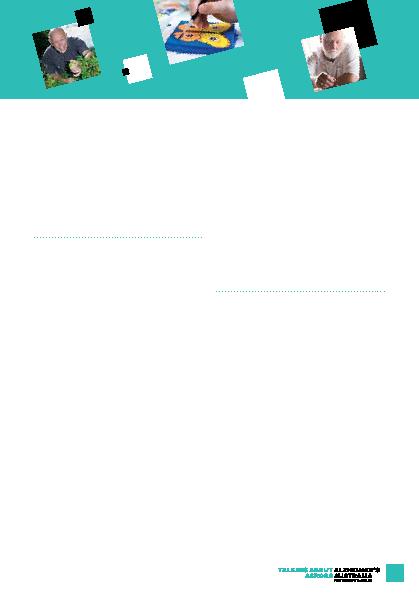
and challenges addressed during this period
of implementation, including developing
an assessment protocol, involving carers,
and program promotion. Two cases will be
discussed to illustrate the program goals,
intervention strategies and outcomes.
National Dementia Risk Reduction Manager,
Alzheimer's Australia Vic
suggesting that living a brain healthy life may
reduce one's risk of developing dementia,
Alzheimer's Australia is using modern
technology and innovative approaches to
increase community awareness and drive
behavioural change.
initiatives that aim to change the community's
perception and behaviour when it comes to
brain health. BrainyApp is the world's first
dementia risk reduction smartphone and
tablet application that provides users with
customised tools to help live a brain healthy
life. Your Brain Matters is the world's first
dementia risk reduction program to be publicly
funded.
reduction evidence. An initial brain health
survey helps guide users on how brain
healthy they are. They are then able to track
with others.
program that has been funded by the
Department of Health and Ageing for three
years (2012/13 to 2014/15). A multi-pronged
approach will be used during the three years
to engage and educate a cross-section of the
population. Your Brain Matters will provide a
platform for partnerships with government,
non-government and commercial organisations
to promote brain health.
world-leading initiatives that provide evidence
based content in an accessible manner.
University of Tasmania
data as a first step in sharing knowledge,
understanding and insights found in the cultural
context of caring for a person with dementia in
the North-West of Tasmania. Using qualitative
research methodology six carers were
interviewed, with the purpose of highlighting
specific ways the carer offered humanistic,
person-centred and playful approaches to their
role and how this is expressed and received.
The research found that carers often facilitated
respectful humanistic expressions within the
day to day experience of caring for a person
with dementia in the community. Of note
were the specific communications through
non-verbal as well as verbal expressions that
demonstrate personal carer qualities such as
empathy, sincerity, integrity, respect, courage
and compassion to name a few. Carers were
able to find connections with the person with